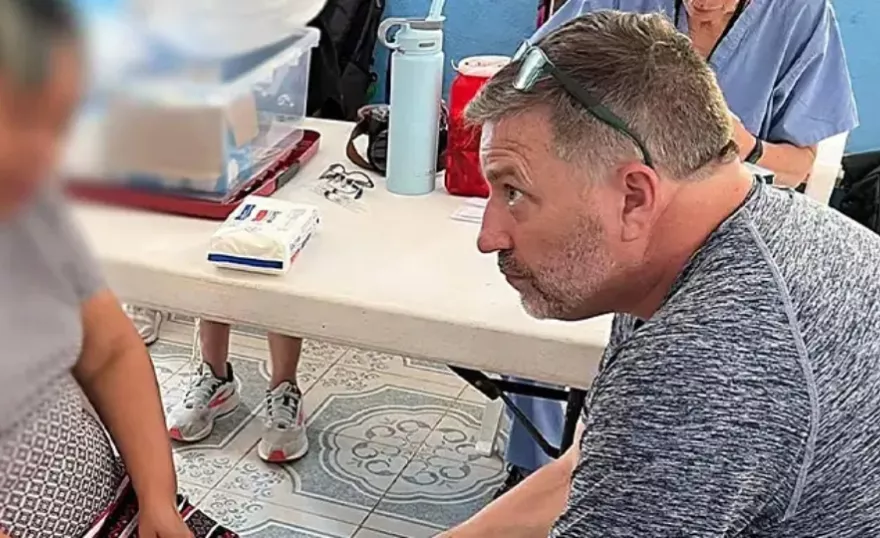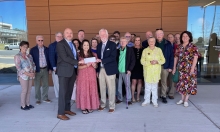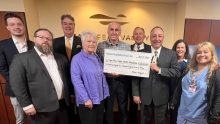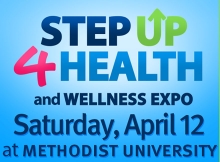General News
This spring, a group of 38 people traveled to Mexico to provide healthcare in the city of Valladolid and surrounding rural communities. The trip, which was organized by Orthopedic Residency Program Director Ben Levine, MD, included attending doctors, residents, occupational therapists, surgical technicians and nurses from Cape Fear Valley Health, Methodist University, Southern Regional Area Health Education Center and other organizations.
Levine has been involved in medical missions since 2010, when he travelled to Haiti to help with earthquake relief. His wife, Cyndi, began mission work in 2001 as a nurse in Ecuador.
“My wife and I started doing mission trips because we felt it was the right thing to do,” Levine said. “We continued to do them because we wanted to teach our children, who have joined us on every trip since our first, that it is OK to be successful, but if you are, it is your responsibility to share your gifts and talents, money and time with those who are less fortunate.”
It’s a lesson they’ve shared with more than their children. Levine estimates they’ve brought “hundreds” of other people on their first mission trips, hoping each will get the same fulfilment they do and continue to give back to their communities and the world.
Tucked in the center of the Yucatan peninsula, Valladolid is about 30 miles east of the famous Chichén Itzá ruins. The area has a great need for medical services, especially in the outlying community, Levine said.
“Some people travel four hours to have care at Centro Medico San Lucas (CSMSL), the charity hospital where we performed surgeries,” Levine said. “We also met with a surgeon who runs another charity hospital outside of Chichén Itzá this year, and we are expecting to provide some care there next year.”
This year, the group performed 38 general surgery cases, eight orthopedic surgery cases. They saw 90 patients were at CMSL, as well as another 220 patients in outlying clinics. Surgeries included gall bladder removals, hernia repairs, an anterior cruciate ligament (ACL) reconstruction and a repair to a broken wrist. The group also participated in non-medical service projects, such as painting, while in the communities.
“One of the reasons we have chosen to work with the organizations that we have – such as Chosen, out of Erie, Pa. – is that we always have projects that are non-medical,” Levine said. “This allows husbands and wives and families to share in this experience.”
Two of the staff from Methodist University, Assistant Professor of Occupational Therapy Sheri Michel, OTD, and Adjunct Faculty Alice “A.J.” Mulholland were among those who were returning to Valladolid for a second year with this mission group.
“There are not many occupational therapists working in that region, and many patients were not aware of how we could help them before,” Michel said. “We provided ways for people to be more independent in their daily lives, to make a difference in how they interact at home or do things for themselves or their families.”
One of the biggest differences the occupational therapists made was in providing wheelchairs, such as one for a 7-year-old girl they’d first seen and measured last year, Michel said. This year, they returned with a wheelchair that allowed her parents to push her rather than carry her everywhere.
“There was an elderly lady who came in that had been using a broom like a cane,” Mulholland said. “She was very unstable when she walked. We splinted her foot and her wrist, gave her a walker, and she was able to get around much better. She said, ‘I’m free again!’”
While the group was providing life-changing medical care, they were also being changed, receiving hands-on experience in atypical learning environments, which forced them to be creative and think on their feet. Levine said the benefits to the providers who do medical missions are many, and he believes that everyone in patient care should have opportunities to do mission work.
“It reinforces why most of us went into this profession, to help other people.” Levine said. “It renews your faith in people because of the simple fact that they thank you just for showing up. The patients pour out gratitude for the act of trying to help, even though the results and permanence of our treatments in these situations may not be what we are used to delivering. Part of the learning for the therapists, surgical techs, nurses and doctors is learning how to diagnose and treat without all the bells, whistles and instruments that are available to us here in the United States.”
Levine plans to return to Valladolid next spring, and he hopes to add an additional trip each year. Part of the mission trips’ success was thanks to stipends for the residents provided by Cape Fear Valley Health Foundation. The average cost for one resident to attend the medical mission trip was about $2,000 and the Foundation provided stipends of $1,500.
“The opportunity to deepen the knowledge and empathy of physicians who perform this type of mission work is one reason the Cape Fear Valley Health Foundation assists with costs for residents to attend these types of trips,” said Vice President for Foundation Sabrina Brooks.
For more information about how to support residents on future mission trips, email foundation@capefearvalley.com or call (910) 615-1285.




